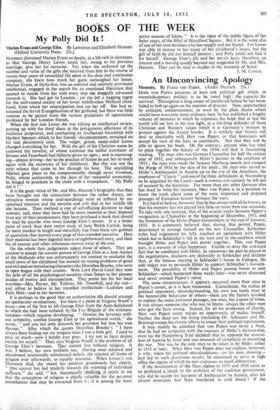BOOKS OF THE WEEK
My Polly Did It!
Marian Evans and George Eliot. By Lawrence and Elizabeth Hanson. (Oxford University Press. 25s.) NOTHING distressed Marian Evans so deeply, in a life rich in distresses, as that George, Henry Lewes could not, owing to his previous marriage, give her his surname. Yet, when she reckoned up the number and value of the gifts she received from him in the course of twenty-four years of unwedded life spent in his close and continuous company, she knew how much her gains outweighed her losses. Marian Evans, at thirty-five, was an unloved and unlovely provincial intellectual, engaged in the search for an emotional liberation that seemed to recede from her with every step she doggedly advanced towards it. She had got to London ; yet she felt a nagging regret for the well-rooted society of her lower middle-class Midland child- hood, from which her emancipation had cut her off. She had re- nounced the fervid Evangelicalism of her girlhood, but there was little succour to be gained from the 'various gradations of agnosticism professed by her London friends.
When she first met Lewes she was editing an intellectual review, putting up with the third share in the polygamous affections of its mediocre proprietor, and conducting an intellectual friendship with Herbert Spencer, which, to her friends' disappointment, remained on his side persistently cool. The vulgar, genial, many-sided Lewes changed everything for her. With the gift of his Christian name he endowed the novelist, of whose existence the toilful translator of Strauss and Feuerbach had hitherto given no signs ; and in encourag- ing—almost driving—her to the practice of fiction he put, her in touch again with the memories of her childhood. But this was not the only release that came to her through his love. The unyielding Marian gave place to the companionable, though never frivolous, Polly, whose authorship, in the days of her successful anonymity, he longed to proclaim in the clubs with a triumphant, "My Polly did it I" It is the great virtue of Mr. and Mrs. Hanson's biography that they have brought out the connection between the rather dreary, un- attractive woman whose soul-searchings were so inflated by un- canalised emotion and the novelist and wife that in her middle life she became. Their method is one of self-effacing devotion to their sources; and, since they have had far more material at their disposal than any of their predecessors, they have produced a book that should be read by anyone who loves George Eliot's novels. It is a better piece of work than their recent study of Jane Welsh Carlyle, being far more modest in length and mercifully free from those raw gobbets of quotation that marred every page of that crowded narrative. Here their material has been digested into a straightforward story, and their list of sources and other references stowed away at the end.
On the whole their judgements repeat those of others. They are content to accept the current picture of George Eliot as a Jane Austen of the Midlands who was unfortunately not content to reinhabit the small town of her childhood but insisted on raising problems of good and evil and orr introducing characters like Dorothea Brooke, who were in open league with their creator. With Lord David Cecil they note the debt of all the psychological novelists since James to her pioneer studies of motive and introspection. They praise her for her local worthies—Mrs. Poyser, Mr. Tulliver, Mr. Trumbull, and the rest— and refuse to believe in her travelled intellectuals—Ladislaw and Felix Holt—and in her heroines.
It is perhaps to the good that an authoritative life should attempt no spectacular revaluations. Yet there is a point in Virginia Woolf's essay—one of the first to lift George Eliot from the -Aunt-Sallyhood to which she had been reduced by the Fun Brigade of the nineteen- twenties—which requires developing. "Dismiss the heroines With- out sympathy, confine George Eliot to the agricultural world," she wrote, "and you not only diminish her greatness but lose her true flavour." After which she quotes Dorothea Brooke's "I have always been finding out my religion since 1 was a little girl. I used to pray so much—now I hardly ever pray. I try not to have desires merely for myself." That, says Virginia Woolf, is the problem of all George Eliot's heroines. Tfry cannot live without religion. It was, I believe, her own problem too. Having once adopted and abandoned emotionally unbalanced beliefs, she rejected all forms of religion ever afterwards, as equally unsound. When Lewes's son Thornton died, she stated her position grandiosely but clearly. "One cannot but feel tenderly towards the yearning of individual sufferers," she said, " but, theoretically speaking, it seed's to me that the conception of religion is chiefly valuable for the personal consolations that may be extracted from it ; it is among the most active sources of falsity." It is the vice of the public figure of her latter years, of the Sibyl of Blandford Square. But it is the voice also of one of her own heroines who has sought and not found. For Lewes was able to restore to her many of her childhood's losses, but the gift of faith he did not himself possess ; and Polly could not find it for herself. George Eliot's life and her novels have, therefore, an interest and a moving qualiWbeyond any suggested by Mr. and Mrs. Hanson. They can be read as studies in the necessity of belief.
J. M. COHEN.


































 Previous page
Previous page